Related Research Articles

Mohammad Sadli was a leading Indonesian policymaker and economist.
Mely Tan Giok Lan, professionally known as Mely G. Tan, was an Indonesian sociologist. Tan obtained her bachelor's degree from the University of Indonesia, later receiving a scholarship to study at Cornell University. After finishing her doctorate at University of California, Berkeley, Tan returned to Indonesia and wrote extensively on economics and Chinese Indonesians. She was a founding commissioner of the National Commission on Violence against Women.
Mira Widjaja (Wong), or Mira W., is a highly popular Indonesian author. In spite of her background being an ethnic Chinese of Cantonese extraction from the Peranakan Chinese diaspora community, her work now reaches audiences from the entire country. Her father, Othniel, was among the pioneers of the Indonesian movie industry. She writes in an accessible genre, and deals with topics such as romance, crime and hospital life. She was a medical doctor before establishing herself as a writer.

Njoo Cheong Seng was a Chinese-Indonesian playwright and film director. Also known by the pen name Monsieur d'Amour, he wrote more than 200 short stories, novels, poems and stage plays during his career; he is also recorded as directing and/or writing eleven films. He married four times during his life and spent several years travelling throughout Southeast Asia and India with different theatre troupes. His stage plays are credited with revitalising theatre in the Indies.

Lie Kim Hok was a peranakan Chinese teacher, writer, and social worker active in the Dutch East Indies and styled the "father of Chinese Malay literature". Born in Buitenzorg, West Java, Lie received his formal education in missionary schools and by the 1870s was fluent in Sundanese, vernacular Malay, and Dutch, though he was unable to understand Chinese. In the mid-1870s he married and began working as the editor of two periodicals published by his teacher and mentor D. J. van der Linden. Lie left the position in 1880. His wife died the following year. Lie published his first books, including the critically acclaimed syair (poem) Sair Tjerita Siti Akbari and grammar book Malajoe Batawi, in 1884. When van der Linden died the following year, Lie purchased the printing press and opened his own company.

Pembrita Betawi was a daily newspaper from Batavia, Dutch East Indies, which was published from 1884 until 1916. It was established as a joint venture between the Indo journalists J. Kieffer and W. Meulenhoff. The newspaper saw several changes of ownership until rights were acquired by Albrecht in 1887. Notable contributors included Lie Kim Hok and Tirto Adhi Soerjo.
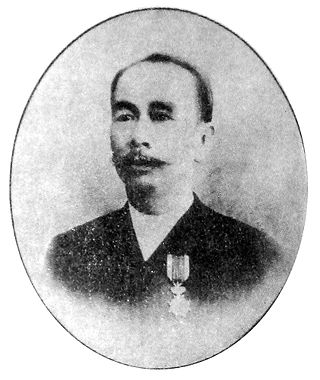
Phoa Keng Hek Sia was a Chinese Indonesian Landheer (landlord), social activist and founding president of Tiong Hoa Hwe Koan, an influential Confucian educational and social organisation meant to better the position of ethnic Chinese in the Dutch East Indies. He was also one of the founders of Institut Teknologi Bandung.
Tan Boen Soan was an ethnic Chinese Malay-language writer and journalist from Sukabumi, Java. He was the author of works such as Koetoekannja Boenga Srigading (1933), Bergerak (1935), Digdaja (1935) and Tjoban (1936). He later wrote for the Sunday Courier of Jakarta.
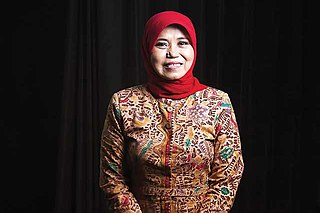
Tri Mumpuni, also known as Bu Puni is an independent researcher, social entrepreneur, philanthropist, social activist, and micro-hydropower inventor who was involved in the project for the development of hydro power electricity for more than half a million people in Indonesia. In 2010 she was elected as board member of National Committee on Innovation. For her work she was awarded the prestigious Ramon Magsaysay Award in 2011. On 13 October 2021, she was appointed a Member of the National Research and Innovation Agency (BRIN) Steering Committee by Joko Widodo.
Loa Sek Hie Sia was a colonial Indonesian politician, parliamentarian and the founding Voorzitter or chairman of the controversial, ethnic-Chinese self-defense force Pao An Tui. He was a Peranakan of Chinese-Indonesian, Austrian and Javanese descent. In his political career, he campaigned against racial discrimination and demanded better healthcare and education for ethnic Chinese in the Dutch East Indies.
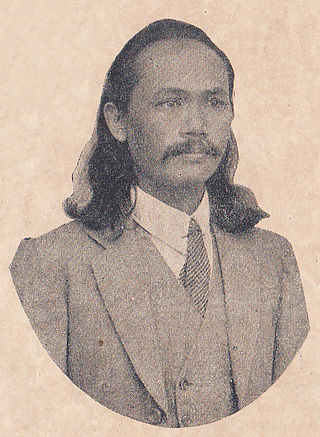
Tan Khoen Swie was a Chinese Indonesian publisher who, through the Tan Khoen Swie Publishing Company, published numerous books in Javanese and Malay.
May-Len Skilbrei is a Norwegian sociologist, criminologist and gender studies scholar. She is Professor of Criminology at the Department of Criminology and Sociology of Law at the University of Oslo Faculty of Law. She has previously been Managing Director of the Fafo Institute for Applied International Studies. She is editor-in-chief of the journal Sosiologi i dag. She has also been President of the Association for Gender Research in Norway, board member of the European Society of Criminology and board member of the University of Oslo Faculty of Law. She also headed the Research network on prostitution in the Nordic countries. She has been described by Aftenposten as one of Norway's leading experts on prostitution and human trafficking.
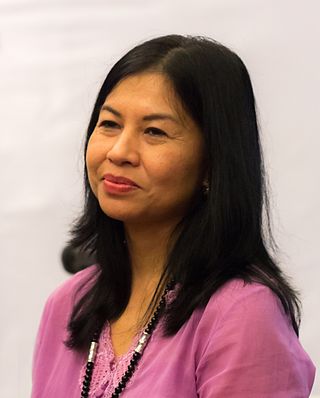
Gadis Arivia is an Indonesian feminist philosopher, lecturer, scholar, and activist. While teaching feminism and philosophy at the University of Indonesia, Arivia founded Jurnal Perempuan, Indonesia's first feminist journal, in 1996. She was arrested by the Suharto government for protesting against the regime in 1998.

Nurul Qomaril Arifin is an Indonesian actress and politician. She has been a member of the People's Representative Council of Indonesia within the Golkar faction since 2004.
Fatimah Hasan Delais (1915-1953), also known by the pen name Hamidah, was an Indonesian novelist and poet. Her novel Kehilangan mestika, 1935, was among the first by a female author to be published by Balai Pustaka; she was one of only a handful of Indonesian women authors to be published at all in the Dutch East Indies, alongside Saadah Alim, Sariamin Ismail, Soewarsih Djojopoespito and a few others.

Rahmah el Yunusiyah was a Dutch East Indies and Indonesian politician, educator, and activist for women's education. Born into a prominent family of Islamic scholars, she was made to leave school in order to get married as a teenager. After a few years of marriage, el Yunusiyah obtained a divorce and returned to her education.
Himmatul Alyah Setiawaty is an Indonesian lawyer and politician of the Democratic Party who served as a member of the People's Representative Council between 2009–2014, representing Banten's 3rd electoral district.

Saparinah Sadli is an Indonesian psychologist and activist. She was a lecturer at the University of Indonesia and spearheaded the establishment of its Department of Women's Studies. A member of the National Commission on Human Rights from 1996 through 2000, she became the inaugural chairperson of the National Commission on Violence against Women in 1998. She has been awarded the Nabil Award, the Roosseno Award, the Cendekiawan Berdedikasi Award from Kompas, and a lifetime achievement award from Femina magazine.
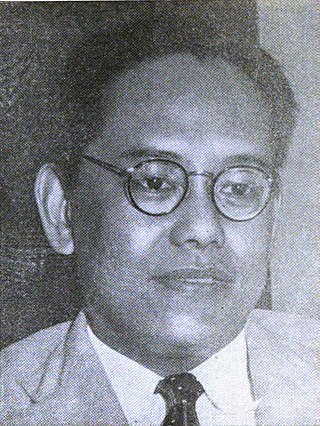
Mohammad Ali was an Indonesian doctor and politician. He served as the Minister of Health between 1953 and 1955.
References
- 1 2 3 4 5 6 7 8 Tan 2012, p. 803.
- 1 2 3 4 5 University of Indonesia, Prof. Mayling.
- 1 2 3 4 5 6 7 8 9 Martisasi 1998, Lebih Jauh.
- 1 2 3 Tan 2012, p. 804.
- 1 2 Setyautama & Mihardja 2008, p. 286.
- 1 2 3 Ninuk and Maria 2001, Mendobrak.
- ↑ Napitupulu 2024, Perempuan Doktor Sosiologi.
- ↑ Damanik 2016, 'Kompas' Beri.
- ↑ Tan 2012, p. 805.